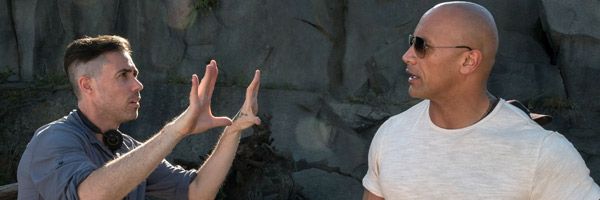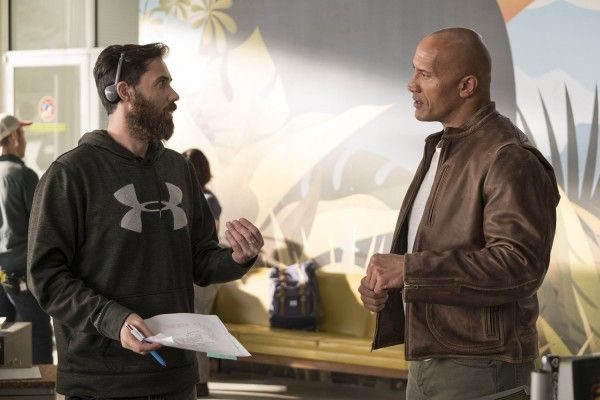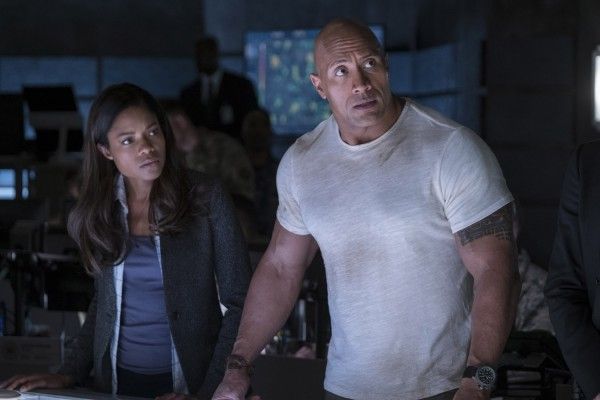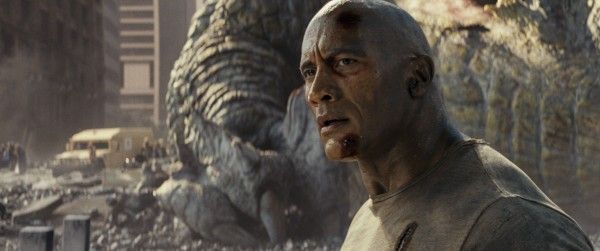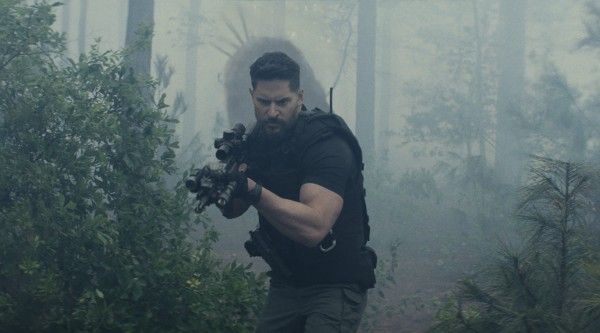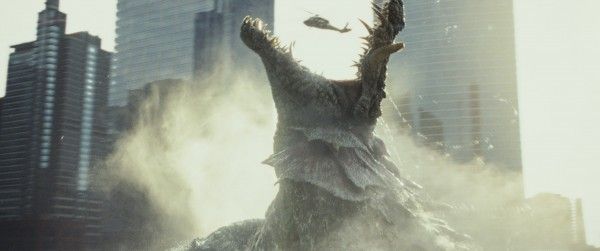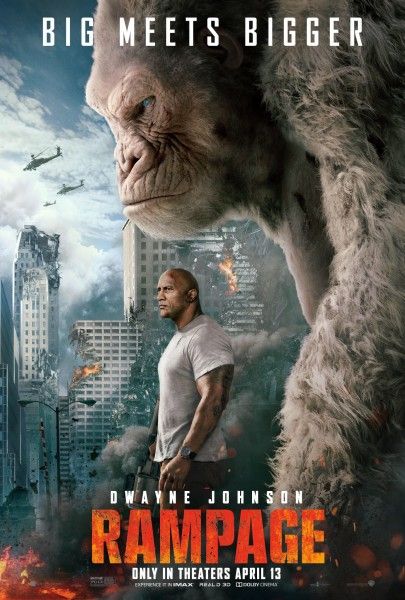Directed by Brad Peyton, the action-adventure smash ‘em up flick Rampage follows what happens when the gorilla best friend of primatologist Davis Okoye (Dwayne Johnson), who has been in his care since he rescued the young orphan from poachers, suddenly finds himself an enormous raging creature due to an experiment gone wrong. And to make matters even worse, there are other similarly altered animals who are destroying everything in their path, leaving Davis to team up with geneticist Kate Caldwell (Naomie Harris) to secure an antidote and save the world.
At the film’s Los Angeles press junket, Collider got the opportunity to sit down with filmmaker Brad Peyton to chat 1-on-1 about breaking the video game to movie curse with Rampage, why Dwayne Johnson is someone that people believe can save the world, why he so strongly identifies with his muse (they’ve worked together three times now), and being inspired by James Cameron and Steven Spielberg for the film’s tone. He also talked about figuring out the tone for Just Cause, another video game to movie project that he’s currently developing with Jason Momoa, why he’d love to make a Marvel superhero movie or a Star Wars movie, and making his Netflix series Frontier.
Collider: This is such a fun movie! It’s exactly what you want from a movie like this.
BRAD PEYTON: I hope! Yeah, that’s what I felt like it was supposed to be.
When this idea came your way, were you aware of the whole video game to movie curse?
PEYTON: As a fan of movies and video games, and all things nerddom and fanboy, because that’s who I am. I knew about it, but when I went to do the movie, I forgot all about that. And then, we had a press day, maybe in the last week of shooting, and someone said, “So, what do you think of this video game curse?” And I was like, “Oh, my god!” I was so happy that didn’t come up until the last week of shooting. I had pushed it out of my mind. Now that I’ve had time to digest it and think about it, the thing that I feel really fortunate about is that it’s the best of both worlds. There’s a game that people recognize and have a nostalgic relationship with, that I can take elements from and pay homage and respect to. A team of artists worked on this thing and you don’t want to just not pay respect to it, so I could take the creatures and I could take little Easter eggs, like Malin [Akerman] in the red dress. The woman in the red dress is a little bit of an Easter egg from the game.
There was just so much stuff that I could do for myself. I could invent this plot. I could invent all these great secondary characters. I could focus on the things that I wanted to focus on, like the theme of trust, and the relationship between Davis and George. None of that is in the game. It was the best of both worlds, where I could do all of this cool stuff with a video game, but I could also do all of these things that I wanted to do, as a filmmaker. It doesn’t have a massive mythology, that you have to make sure you deal with correctly. There just wasn’t any of that baggage. That’s a tricky line, when it comes to adaptations of video games. I play video games, all the time, and I know how immersive they can be. I fall into voids when I play video games. With Red Dead Redemption, I didn’t leave the house for two months. Those worlds are so rich and so immersive, and you’re the hero, so how do you compete with that when you’re doing a narrative that is supposed to be similar. This movie didn’t have those pitfalls or trappings. This was a very fortunate situation.
What’s the situation with Just Cause, where you’re doing another video game turned movie? Are you thinking more about that curse now?
PEYTON: No, I’m not focusing on the curse. I don’t believe in curses.
You’ve broken the curse with Rampage!
PEYTON: I hope so! Knock on wood, I broke the video game curse. I think it comes down to paying respect to the material, but giving people a different experience, that’s unique unto itself and that is built off of the same foundation. With Just Cause, I broke it down to a tone and what the title really is about. It’s called Just Cause. It’s about someone who’s like, “I’m gonna make something unjust in the world right.” The world has this fun tone. When I talked to Jason Momoa about it, he was like, “I want to do a bad-ass Bond. I want to do a guy that just sits on the beach and drinks.” I pitched him one of the first images from the game, which is the guy sitting on the beach and having a beer, and there’s a boat out in the water. He hits a button, the boat blows up, and then he drinks his beer. I was like, “That’s who this guy is,” and he was like, “Oh, my god, yes! I’ll do that!” That is tonally what [the film] should be, and the title represents that idea. From there, we have to make our own thing. It has to pay respect and give the fans what they need, but also be a unique thing.
Where are you at with the development for that?
PEYTON: We’re working on the script. Jason [Momoa], myself, and my producing partner, Jeff [Fierson], have a show on Netflix, called Frontier, so we have a good working relationship with him, and he’s a really easy, good guy to work with. At this point, we’re just working on his character and we’re working on the script.
You’ve put Dwayne Johnson in the path of a volcano and the epicenter of an earthquake, and now he’s got these creatures after him. What is it about him that makes him someone that can save the world, in any circumstance, and people just buy it and love it?
PEYTON: He’s larger than life, in real life. I don’t quite totally understand it, but when he does things, you just believe it. I deal with this, as a filmmaker, where I’ll see a line written and be like, “I don’t know about that.” And then, he’ll do it, and I’m like, “Damn, that is movie star charisma!” I think it’s that. He has this fearlessness and self-belief, mixed with more charisma than 400 normal people taped together. He just has that thing, so when he fully devotes himself to an idea, you go, “Yeah, of course he could save the world!” I try to support that with good storytelling, emotion and rationalization, as to how someone could do all this stuff, but it’s amazing how much people just want to believe it. No matter what he’s doing, people are just like, “I wanna see him smash dinosaurs!” People want to get on the ride with Dwayne.
What makes him your muse?
PEYTON: For me, it’s interesting because we both come from nothing, from a little bit on the wrong side of the tracks, we worked our way up, and we’re around the same age. There are many differences, like I’m not a golden god, but there’s a work ethic there and a drive. I’ve learned a lot from working with him. When I was a really poor, young, aspiring filmmaker, I watched and read everything that I could. I would read every book on filmmaking and watch every interview, and I remember seeing an interview with Dwayne for the Gridiron Gang, and I thought to myself, “Man, he seems like a genuinely good person.” I was 21 years old and I was like, “Out of all the stars in the world, I think I’d get along with him.” It was somewhat naive, but that thing in him is what drew me to working with him. And then, when I working with him, I was like, “He is that thing.” He is a genuinely good, hard-working person, who has his heart in the right place and an abundance of talent.” I can work with him because I relate to him, but he has all of these superpowers that I don’t have. It’s a really interesting working relationship. Ultimately, what’s great about it, when we get together, is that I feel we make each other better. The end product becomes greater than the sum of the parts, which is not always the case. I feel really, really fortunate that that’s how we work.
This seems like a tricky movie, in the sense that you want to have some silly fun and there’s some great humor to it, but there’s also some seriousness. What did you use to gauge that balance?
PEYTON: I’m going to thank James Cameron for that one. I grew up in the late ‘80s, early ‘90s, with a lot of Cameron and [Steven] Spielberg. Those guys are masters. As a filmmaker, I put theme and the emotion first. I think about, what is the movie about? This movie is about friendship and trust, ultimately. There’s a little bit of anti-poaching and some substantial stuff in there, that you can then build on top of. What’s important to me is thinking about, what’s the theme? What’s the movie about? Where’s the heart of this? Where’s the emotion of this? Those are my compasses. I’m very much a gut filmmaker. I let those things guide me, instinctively. I feel lucky that I grew up when I did because, to me, the ultimate tone of a movie is Terminator 2. I grew up on Star Wars and reading Marvel comics. I’m so excited that they’re making Marvel movies. I have a house on the east coast, out in the woods, where my girlfriend and I live when we’re not working, and I literally have 4,000 Marvel comics from my childhood. My parents sold their house and were like, “You need to get your crap out of our house.” I was going through the comics with her and I was like, “Hey, look, it’s Black Panther #1! I don’t even remember owning that! It’s Spider-Man #1!”
I collected all that stuff. It’s in my DNA. I grew up with this stuff. You think back to Terminator 2 and it’s a robot from the future with an Austrian accent, who beats up some bikers, puts his leather chaps on, and comes out to “Bad to the Bone.” And at the end of the movie, he gives a thumbs up and you’re weeping. How does that work?! If you broke that down and said, “Okay, here’s the pitch, and we’re gonna do these things,” people would say, “James Cameron, you’re insane!” When I said, “Okay, this is what I wanna do with Rampage,” some people were like, “What?!” I even have friends of mine that are big writers, who’ve done big, huge movies, and I’d show them an early cut and they’d be like, “This shouldn’t work. How does this work?!” My gut reaction to that is, “I grew up in the right time period and I’m making what I wanna see, which is what I grew up on. That’s what I’m inspired by, and I’m very clear on what the movie is about. I think those things come off the rails when your heart isn’t in it and your gut isn’t it and when you don’t have a really strong compass to what you should really be doing. I stress out a lot because I try to keep my compass true north, at all times, every day, which is exhausting, but that’s the guide.
As someone who is such a big fan, have you thought about throwing your hat into the ring for a Marvel superhero movie, or a Star Wars movie?
PEYTON: The ultimate dream, for me, is to do those types of things. I just started my own company with my producing partner, called ASAP Entertainment, and we’re developing our own stuff, in case I never get offered those things. That’s my sweet spot. I love elevated genre. I love science fiction and fantasy. That’s what makes this easy for me to do. I could talk to Collider, all day long, because this is my life. I literally still have a huge box of unopened Star Wars toys. I still have 4,000 Marvel comics. The dream is to go do X-Men, or Superman, or Star Wars. Are you kidding?! My head would explode, every day. I would get a Star Wars tattoo. I’d be like, “I guess I should retire now. That’s all I need!” Plan B is to create my own stuff, in case I don’t get offered that because a lot of that is out of your control, but that would be a dream come true.
And your TV series Frontier (streaming on Netflix) is so different from all of that and really shows a very different side of what you can do.
PEYTON: Yeah, I wanted to go prove to myself that I didn’t need visual effects and I could just work with actors. It’s unpredictable, what comes your way. That came my way, and I was like, “Jason is great. This material is pretty cool. I don’t love period pieces, but I wonder if I could make one that I would dig?”
It seems like it must be a tough and brutal shoot.
PEYTON: Tough in a different way, with the elements. I shot it where I grew up, in Newfoundland in Canada, and it was negative 22, one night. Snow was blowing, horizontally, off a lake and everyone was curled up, going, “What the hell are we doing here?” And I was like, “Action!” They had to get in the water and I was like, “I’m really sorry guys, but this is what we’ve gotta do!” That was two episodes, so I could go do that and set up the show, and then go back to making Rampage.
Rampage opens in theaters on April 13th.

